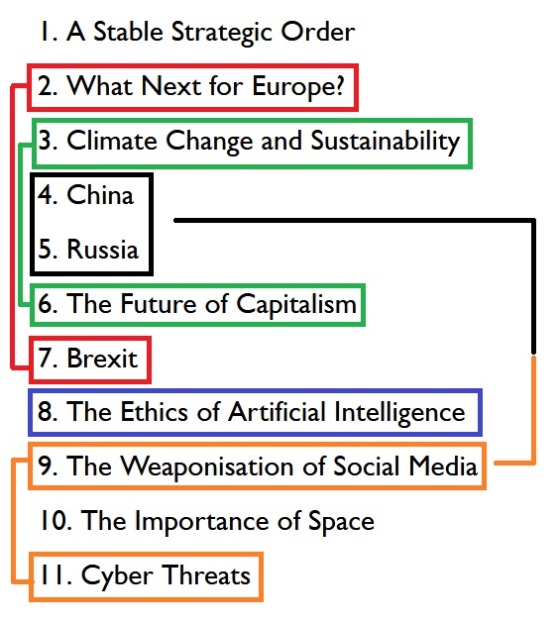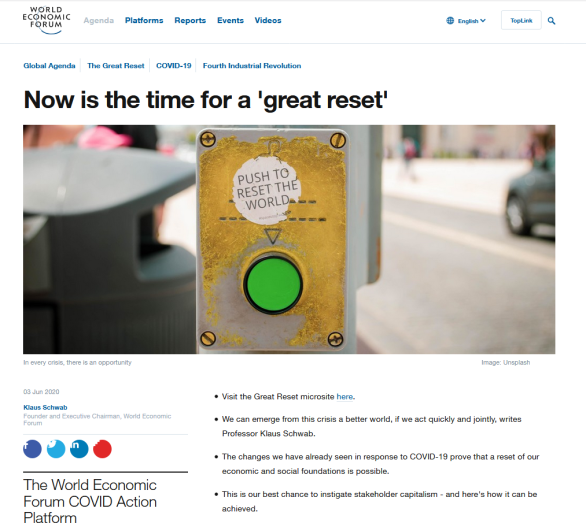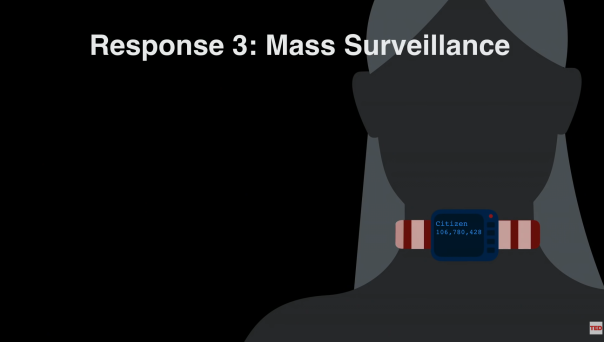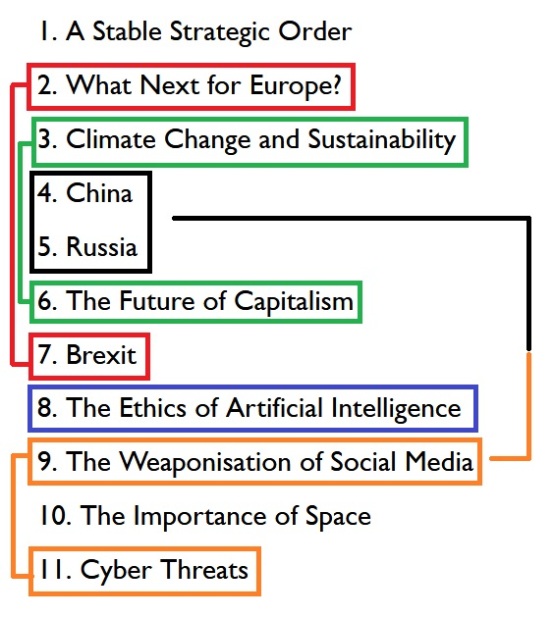Important note: It is well past the period spanning the end of May and beginning of June when Bilderberg meetings are ordinarily scheduled, so it should be observed that the home page of the official Bilderberg website still declares in bold capitals:
THE MEETING 2020 IS POSTPONED.
“The illusion of freedom will continue as long as it’s profitable to continue the illusion. At the point where the illusion becomes too expensive to maintain, they will just take down the scenery, they will pull back the curtains, they will move the tables and chairs out of the way and you will see the brick wall at the back of the theater.”
— Frank Zappa
This is the seventh and last of a sequence of articles based around the ‘key topics’ at last year’s Bilderberg conference discussed here in relation to the prevailing political agenda and placed within the immediate historical context.
This piece focuses on issues relating to the future of humanity and including ‘The Ethics of Artificial Intelligence’:
*
The new normal
In May 2017, Forbes magazine published a piece by financial analyst and writer John Maudlin that bears the prophetic title: “Brace Yourself For ‘The Great Reset’”. Interestingly, the piece is not concerned with climate change or forthcoming pandemics, but simply addresses what Maudlin describes as “the largest twin bubbles in the history of the world”:
One of those bubbles is global debt, especially government debt. The other is the even larger bubble of government promises.
These promises add up to hundreds of trillions of dollars. That’s vastly larger than global GDP.
These are real problems we must face. It will mean forging a new social contract. It will also require changes to taxes and the economy. I believe that within the next 5–10 years, we have to end the debt and government promises.
The banking crisis that broke in 2008 has festered ever since; western economies today are continually propped up thanks to vast injections of cheap money: non-stop rounds of quantitative easing with interest rates maintained at levels close to zero. Maudlin was right therefore to forewarn of the ramifications of what have been systematic failures; ones that by the time of publication of his article had already generated a global debt-to-GDP of 325%.
Moreover, he was far from alone in sounding the alarm. As recently as last July, the New York Federal Reserve’s own in-house model, which predicts the probability of a US recession occurring in the next 12 months and is regarded as critical indicator, recorded its highest level since 2009: a reading of 32.9% for June. As Business Insider reported:
“That could mean tough times ahead, considering the measure has breached the 30% threshold before every recession since 1960.” 1
Then in October (still in the months before covid), former Bank of England Governor, Mervyn King, went on the record to say that he believed the world was sleepwalking into another crash:
Giving a lecture in Washington at the annual meeting of the International Monetary Fund, King said there had been no fundamental questioning of the ideas that led to the crisis of a decade ago.
“Another economic and financial crisis would be devastating to the legitimacy of a democratic market system,” he said. “By sticking to the new orthodoxy of monetary policy and pretending that we have made the banking system safe, we are sleepwalking towards that crisis.”
He added that the US would suffer a “financial armageddon” if its central bank – the Federal Reserve – lacked the necessary firepower to combat another episode similar to the sub-prime mortgage sell-off. 2
Click here to read the full Guardian article.
Nor is Maudlin isolated when it comes to questioning whether levels of public spending are sustainable, although here he is necessarily buttressing his own ideological stance and keen to advocate further neoliberal reforms as a matter of unavoidable necessity. Thus, he continues:
What I mean by government promises are pensions and healthcare benefits. 3
Yet beyond the title of Maudlin’s piece, so far his forecast has been rather less than impressive. Instead of policies of stringent austerity, the crisis we now face has in fact resulted in a sudden flood of government spending. It transpires that ‘magic money trees’ aren’t really so hard to find after all.
Moreover, a sizeable fraction of that money has gone directly into the pockets of ordinary people through elaborate schemes set up to compensate for the shutdown of our societies. Meanwhile, a great deal more is being siphoned off into the coffers of global corporations – in America especially, this grand theft has been brazen, whereas in Britain the transfer of public money is a stealthier affair: a prime example being the £100 million wasted on privatised track-and-trace systems run by Serco.
Peter Geoghegan of OpenDemocracy discloses how the Tory government has exploited the coronavirus crisis and handed over multiple millions of pounds of public money in the form of contracts to friends of the party:
Of course, the situation is a temporary one and so the current economic measures are stopgaps, but still this easy availability of public money puts an immediate lie to simplistic arguments that previously justified a decade of austerity. Governments are not constrained to live within their means like households. Austerity is always an ideological choice and never an inescapable inevitability – as I have argued many times before, it is in any case counterproductive because it stifles growth.
That said, historically high levels of government debt do provide a perfect and very nearly irresistible excuse for waves of future austerity and for the sell-off of public assets. This is how disaster capitalism works.
*
On October 7th, economists Michael Hudson and Steve Keen were invited to discuss the current state of western economies and how the so-called ‘K-shaped recovery’ is now dividing the world into haves and have-nots with Peter Lavelle on RT’s Crosstalk.
Michael Hudson explained the ‘new normal’ as follows:
“What has become normal since 2008 has been completely different from the old normal. People have the idea that with ‘normal’ you go back to a balance. But really the economy hasn’t grown at all since the 2008 crisis. All of the growth in GDP, all of the growth in wealth, has accrued to the financial sector, to the real estate sector, and to the one percent. For the ninety-nine percent of the people, they’ve gone down and down and down.
“So the ‘new normal’ is you can’t get rich again by buying housing and joining the middle class like you used to. The ‘new normal’ is paying all of your increase in wages on debt service, in rents, and in monopoly prices. And so the ‘new normal’ is that the market is going to shrink and shrink until we look like Greece looks in the last five years. Think of the ‘new normal’ as looking like Greece: debt deflation and rent deflation.” [from 2:10 mins]
*
The great reset
Today, if you visit the website of the World Economic Forum, you will come across an article by its founder and Executive Chairman Klaus Schwab that likewise calls for “a great reset”. From the main page, there is then a link to what WEF calls its “Great Reset microsite”, where the blurb reads:
As we enter a unique window of opportunity to shape the recovery, this initiative will offer insights to help inform all those determining the future state of global relations, the direction of national economies, the priorities of societies, the nature of business models and the management of a global commons. Drawing from the vision and vast expertise of the leaders engaged across the Forum’s communities, the Great Reset initiative has a set of dimensions to build a new social contract that honours the dignity of every human being.
Schwab, a former member of the Bilderberg group steering committee, writes that:
We must use it [the COVID-19 crisis] to secure the Great Reset that we so badly need. That will require stronger and more effective governments, though this does not imply an ideological push for bigger ones. And it will demand private-sector engagement every step of the way.
Dressed up as a synthesis of capitalism and socialism, here the thinly-veiled intention is to amalgamate the worst elements of both systems with an ever-tightening alliance between global corporations and governments, and the replacement of any meaningful representative democracy with greater accountability going instead to so-called “stakeholder” interests. Schwab continues:
The Great Reset agenda would have three main components. The first would steer the market toward fairer outcomes. To this end, governments should improve coordination (for example, in tax, regulatory, and fiscal policy), upgrade trade arrangements, and create the conditions for a “stakeholder economy.” At a time of diminishing tax bases and soaring public debt, governments have a powerful incentive to pursue such action.
Combined with these market-orientated reforms the public can also look forward to enjoying “socialism” in the form of restrictions on individual freedom for reasons of “sustainability”, “intellectual property” rights, green taxes, and, within an overarching plan for the ‘Fourth Industrial Revolution’, the growth of “smart cities”:
Moreover, governments should implement long-overdue reforms that promote more equitable outcomes. Depending on the country, these may include changes to wealth taxes, the withdrawal of fossil-fuel subsidies, and new rules governing intellectual property, trade, and competition.
The second component of a Great Reset agenda would ensure that investments advance shared goals, such as equality and sustainability. […]
[F]or example, building “green” urban infrastructure and creating incentives for industries to improve their track record on environmental, social, and governance (ESG) metrics.
The third and final priority of a Great Reset agenda is to harness the innovations of the Fourth Industrial Revolution to support the public good, especially by addressing health and social challenges. 4
Click here to read the full piece by Klaus Schwab entitled “Now is the time for a ‘great reset’”.
*
AI is key to the NWO transformation
Meanwhile, as long ago as April 3rd – albeit with his crystal ball firmly in hand – Bilderberg’s most illustrious war criminal wrote this in an op-ed by The Wall Street Journal:
When the Covid-19 pandemic is over, many countries’ institutions will be perceived as having failed. Whether this judgment is objectively fair is irrelevant. The reality is the world will never be the same after the coronavirus.
Adding:
Global leaders have learned important lessons from the 2008 financial crisis. The current economic crisis is more complex: The contraction unleashed by the coronavirus is, in its speed and global scale, unlike anything ever known in history. 5
Kissinger’s solution to this impending crisis when boiled down (and seeing through all of the cant about “ameliorat[ing] the effects of impending chaos on the world’s most vulnerable populations” and “defend[ing] and sustain[ing] their Enlightenment values”) is this: to “safeguard the principles of the liberal world order.” Where for “liberal” we must read “neo-liberal”, and for “world order” we should prefix with the adjective “new” (as Kissinger himself has done on countless past occasions).
Indeed, here is Kissinger presenting a keynote conversation just last year at the George W. Bush Presidential Center beneath the very title “The New World Order” (not that he elucidates much on what he envisions for the NWO):
Kissinger’s view of ‘the shape of things to come’ might be better gauged from an article published August last year and provocatively entitled “The Metamorphosis” that was co-authored by Bilderberg confederate, former executive chairman of Alphabet Inc and current chair of the US Department of Defense’s Defense Innovation Advisory Board, Eric Schmidt, along with fellow techie and former director of Amazon, Daniel Huttenlocher. In it they write:
If AI improves constantly—and there is no reason to think it will not—the changes it will impose on human life will be transformative. Here are but two illustrations: a macro-example from the field of global and national security, and a micro-example dealing with the potential role of AI in human relationships.
The first of these examples relates to the development of new weapons and strategies, and implications for arms control and deterrence. The second is headed simply “Human Contact” and begins as follows:
Google Home and Amazon’s Alexa are digital assistants already installed in millions of homes and designed for daily conversation: They answer queries and offer advice that, especially to children, may seem intelligent, even wise. And they can become a solution to the abiding loneliness of the elderly, many of whom interact with these devices as friends.
The more data AI gathers and analyzes, the more precise it becomes, so devices such as these will learn their owners’ preferences and take them into account in shaping their answers. And as they get “smarter,” they will become more intimate companions. As a result, AI could induce humans to feel toward it emotions it is incapable of reciprocating.
Already, people rank their smartphones as their most important possession. They name their Roombas, and attribute intent to them where none exists. What happens when these devices become even more sophisticated? Will people become as attached to their digital pets as to their dogs—or perhaps even more so?
All of which tiptoes very lightly indeed around the major concern when it comes to our routine installation of hi-tech surveillance equipment inside the home; Alexa already far exceeds the intrusion of Orwell’s telescreens in his dystopian nightmare Nineteen Eighty-Four – and there is something else to worry about here (mention of it is again buried away in the middle of the text):
AI algorithms will help open new frontiers of knowledge, while at the same time narrowing information choices and enhancing the capacity to suppress new or challenging ideas.
As Eric Schmidt is perfectly well aware, of course, this is precisely what the Google algorithm already does. Social media platforms have also been installing filters to censor content, narrow opinion and condemn us to engage in ever decreasing bubbles of discussion. When one echo chamber then rubs up against another no light is shed, but only increasing levels of heat. Obviously, it isn’t AI as such that narrows and suppresses public debate, but the actions of the tech giants with their more or less unregulated control over content.
Then, finally, they get to the crux of the matter:
The technological capacity of governments to monitor the behavior and movements of tens or hundreds of millions is likewise unprecedented. Even in the West, this quest can, in the name of harmony, become a slippery slope. Balancing the risks of aberrant behavior against limits on personal freedom—or even defining aberrant—will be a crucial challenge of the AI era. 6
But once again, it isn’t AI that defines “aberrant” either, it’s whoever operates the AI and has control over the algorithms – and to understand who that is, I recommend studying the lists of Bilderberg participants throughout the past decade. Ever more prominent amongst the ranks of the great and good you will find many of the biggest names in Silicon Valley – one of whom, Reid Hoffman, also happen to sit on Eric Schimdt’s Defense Innovation Advisory Board alongside owner of Amazon and The Washington Post, “the richest man in modern history”, Jeff Bezos.
*
Klaus Schwab and the fascist new deal
“We are at the threshold of a radical systemic change that requires human beings to adapt continuously. As a result, we may witness an increasing degree of polarization in the world, marked by those who embrace change versus those who resist it.
“This gives rise to an inequality that goes beyond the societal one described earlier. This ontological inequality will separate those who adapt from those who resist—the material winners and losers in all senses of the words. The winners may even benefit from some form of radical human improvement generated by certain segments of the fourth industrial revolution (such as genetic engineering) from which the losers will be deprived. This risks creating class conflicts and other clashes unlike anything we have seen before”
— Klaus Schwab 7
*
Those who believe the multi-billionaire class of plutocrats who gather annually at Davos and more “privately” at Bilderberg do so in pursuit of “socialism” are either delusional or else miss the point for more deliberate reasons. In fact, the primary agenda set forth by these exclusive clubs is rather more straightforward and perfectly understandable if we adjust to see the world through the jaundiced eyes of its membership. The goal is to forge an ever-tightening relationship between the corporations (which they already own and control) and governments (where political power ultimately resides) until eventually there will be no distinction.
This process of public-private convergence has been underway for many decades with groups like Bilderberg and WEF at the vanguard. If and when the merger they seek is completed, our society will be governed wholly in accordance to a political regime known as corporatism, which is a form of fascism (of the type first implemented by Mussolini).
As Winter Oak explains in a very recent article entitled “Klaus Schwab and his Great Fascist Reset”:
While communism envisages the take-over of business and industry by the government, which – theoretically! – acts in the interests of the people, fascism was all about using the state to protect and advance the interests of the wealthy elite.
In other words, fascism and socialism (at least ‘state socialism’ which first emerged in the Soviet Union) are superficially similar but mainly because they are both statist, while in other ways they are diametrically opposed. That said, fascists have historically used “socialism” for left-cover, and this trend continues today.
The same article then breaks down how Schwab’s plans for a “stakeholder society” (with its leftist overtones) can be rolled out in order to achieve the kinds of fascist (or corporatist) ends desired:
[I]n 1971 [Schwab] founded the European Management Forum, which held annual meetings at Davos in Switzerland. Here he promoted his ideology of “stakeholder” capitalism in which businesses were brought into closer co-operation with government.
“Stakeholder capitalism” is described by Forbes business magazine as “the notion that a firm focuses on meeting the needs of all its stakeholders: customers, employees, partners, the community, and society as a whole”.
Even in the context of a particular business, it is invariably an empty label. As the Forbes article notes, it actually only means that “firms can go on privately shoveling money to their shareholders and executives, while maintaining a public front of exquisite social sensitivity and exemplary altruism”.
But in a general social context, the stakeholder concept is even more nefarious, discarding any idea of democracy, rule by the people, in favour of rule by corporate interests.
Society is no longer regarded as a living community but as a business, whose profitability is the sole valid aim of human activity.
Schwab set out this agenda back in 1971, in his book Moderne Unternehmensführung im Maschinenbau (Modern Enterprise Management in Mechanical Engineering), where his use of the term “stakeholders” (die Interessenten) effectively redefined human beings not as citizens, free individuals or members of communities, but as secondary participants in a massive commercial enterprise.
The aim of each and every person’s life was “to achieve long-term growth and prosperity” for this enterprise – in other words, to protect and increase the wealth of the capitalist elite.
Winter Oak then highlights and discusses at length admissions made by Schwab in his writings for public consumption and in particular his 2016 book The Fourth Industrial Revolution [the same term is often abbreviated to 4IR]:
Schwab waxes lyrical about the 4IR, which he insists is “unlike anything humankind has experienced before”.
He gushes: “Consider the unlimited possibilities of having billions of people connected by mobile devices, giving rise to unprecedented processing power, storage capabilities and knowledge access. Or think about the staggering confluence of emerging technology breakthroughs, covering wide-ranging fields such as artificial intelligence (AI), robotics, the internet of things (IoT), autonomous vehicles, 3D printing, nanotechnology, biotechnology, materials science, energy storage and quantum computing, to name a few. Many of these innovations are in their infancy, but they are already reaching an inflection point in their development as they build on and amplify each other in a fusion of technologies across the physical, digital and biological worlds”.
He also looks forward to more online education, involving “the use of virtual and augmented reality” to “dramatically improve educational outcomes”, to sensors “installed in homes, clothes and accessories, cities, transport and energy networks” and to smart cities, with their all-important “data platforms”.
“All things will be smart and connected to the internet”, says Schwab, and this will extend to animals, as “sensors wired in cattle can communicate to each other through a mobile phone network”.
He loves the idea of “smart cell factories” which could enable “the accelerated generation of vaccines” and “big-data technologies”.
These, he ensures us, will “deliver new and innovative ways to service citizens and customers” and we will have to stop objecting to businesses profiting from harnessing and selling information about every aspect of our personal lives.
“Establishing trust in the data and algorithms used to make decisions will be vital,” insists Schwab. “Citizen concerns over privacy and establishing accountability in business and legal structures will require adjustments in thinking”.
At the end of the day it is clear that all this technological excitement revolves purely around profit, or “value” as Schwab prefers to term it in his 21st century corporate newspeak.
Perhaps unsurprisingly, Schwab also writes with tremendous enthusiasm about the use of the blockchain (the distributed ledger behind cryptocurrencies like Bitcoin) and 5G technology, and then, having pronounced that “a world full of drones offers a world full of possibilities”, he spells out what the “revolution” means at a human level, saying “Already, advances in neurotechnologies and biotechnologies are forcing us to question what it means to be human”
The following passage is quoted directly from his more recent book Shaping the Future of the Fourth Industrial Revolution (2018):
“Fourth Industrial Revolution technologies will not stop at becoming part of the physical world around us—they will become part of us. Indeed, some of us already feel that our smartphones have become an extension of ourselves. Today’s external devices—from wearable computers to virtual reality headsets—will almost certainly become implantable in our bodies and brains. Exoskeletons and prosthetics will increase our physical power, while advances in neurotechnology enhance our cognitive abilities. We will become better able to manipulate our own genes, and those of our children. These developments raise profound questions: Where do we draw the line between human and machine? What does it mean to be human?”
This is where Schwab turns to a favourite subject: transhumanism – and please bear in mind that he was raised in Germany (born in 1938) during the last years of The Third Reich – which as Winter Oak reminds us was “a police-state regime built on fear and violence, on brainwashing and control, on propaganda and lies, on industrialism and eugenics, on dehumanisation and ‘disinfection’, on a chilling and grandiose vision of a “new order” that would last a thousand years.”
The article continues:
A whole section of this book is devoted to the theme “Altering the Human Being”. Here he drools over “the ability of new technologies to literally become part of us” and invokes a cyborg future involving “curious mixes of digital-and-analog life that will redefine our very natures”.
He writes: “These technologies will operate within our own biology and change how we interface with the world. They are capable of crossing the boundaries of body and mind, enhancing our physical abilities, and even having a lasting impact on life itself “.
No violation seems to go too far for Schwab, who dreams of “active implantable microchips that break the skin barrier of our bodies”, “smart tattoos”, “biological computing” and “custom-designed organisms”.
He is delighted to report that “sensors, memory switches and circuits can be encoded in common human gut bacteria”, that “Smart Dust, arrays of full computers with antennas, each much smaller than a grain of sand, can now organize themselves inside the body” and that “implanted devices will likely also help to communicate thoughts normally expressed verbally through a ‘built-in’ smartphone, and potentially unexpressed thoughts or moods by reading brain waves and other signals”.
“Synthetic biology” is on the horizon in Schwab’s 4IR world, giving the technocratic capitalist rulers of the world “the ability to customize organisms by writing DNA”.
The idea of neurotechnologies, in which humans will have fully artificial memories implanted in the brain, is enough to make some of us feel faintly sick, as is “the prospect of connecting our brains to VR through cortical modems, implants or nanobots”.
It is of little comfort to learn that this is all – of course! – in the greater interests of capitalist profiteering since it “heralds new industries and systems for value creation” and “represents an opportunity to create entire new systems of value in the Fourth Industrial Revolution”.
Click here to read the full article by Winter Oak entitled “Klaus Schwab and His Great Fascist Reset”.
And here to read an extended post about the nature of fascism and how historically it has repeatedly disguised its true intentions with recourse to ‘left cover’.
*
The future of humanity
“Evolution moves towards greater complexity, greater elegance, greater knowledge, greater intelligence, greater beauty, greater creativity, and greater levels of subtle attributes such as love. In every monotheistic tradition God is likewise described as all of these qualities, only without limitation: infinite knowledge, infinite intelligence, infinite beauty, infinite creativity, infinite love, and so on. Of course, even the accelerating growth of evolution never achieves an infinite level, but as it explodes exponentially it certainly moves rapidly in that direction. So evolution moves inexorably towards this conception of God, although never quite reaching this ideal. We can regard, therefore, the freeing of our thinking from the severe limitations of its biological form to be an essentially spiritual undertaking.”
— Ray Kurzweil 8
*
Nick Bostrom is a philosopher with deep scientific and technical training 9 ,who aside from being Director of the Future of Humanity Institute at Oxford University is also co-founder of the World Transhumanist Association (renamed Humanity+, Inc.) as well as an acknowledged inspiration for Elon Musk and Bill Gates. 10
A self-confessed utopian, Bostrom is strangely religious in that way only scientific materialists can be: so he has dreams of constructing a future heaven by wholly technological means and with ethical foundations grounded and held firm by pure reason. Inspired, he says, by a youthful acquaintance with the philosophies of Schopenhauer and Nietzsche, his envisioned Utopia will be a brave new world that is infinitely more delightful, more pleasurable, and finally more pristine than Huxley’s arch conception – a place without death and, in all likelihood, devoid of all corporeality. Subscribing to an increasingly fashionable opinion that the physical universe is just some kind of digital simulation (it used to be clockwork), Bostrom’s Utopia, is set to be the best of all possible simulations: the matrix par excellence! 11
That said, Bostrom is amongst first to acknowledge that unavoidably the road to hell is also paved with good intentions. Indeed, lurking just beneath his sometimes optimistic and occasionally exuberant facade, it is hard not to discern a rather desperate almost pathological desire to escape the horrors of the material world.
During an interview conducted by the Guardian in 2016, he was asked about membership of Alcor, “the cryogenic initiative that promises to freeze mortal remains in the hope that, one day, minds can be reinvigorated and uploaded in digital form to live in perpetuity.” The conversation with Tim Adams then proceeded as follows:
“I have a policy of never commenting on my funeral arrangements,” he says.
But he thinks there is a value in cryogenic research?
“It seems a pretty rational thing for people to do if they can afford it,” he says. “When you think about what life in the quite near future could be like, trying to store the information in your brain seems like a conservative option as opposed to burning the brain down and throwing it away. Unless you are really confident that the information will never be useful…”12
Bostrom was one of a handful of academics and another of the new faces who made it on to the guest list at Bilderberg last year. A few months prior to his attendance, in January 2019, he had also been invited to chat with head of TED and business entrepreneur, Chris Anderson, about his “Vulnerable World Hypothesis”.
As Business Insider reported:
Philosopher Nick Bostrom is known for making scary predictions about humanity.
Over 15 years ago, he made the case that we are all living in a Matrix-like simulation run by another civilization. The idea, though difficult to swallow, is well-regarded by some philosophers, and has even been sanctioned by Elon Musk.
Many years later, Bostrom isn’t done outlining frightening scenarios.
On Wednesday, he took the stage at the TED 2019 conference in Vancouver, Canada, to discuss another radical theory. While speaking to head of the conference, Chris Anderson, Bostrom argued that mass surveillance could be one of the only ways to save humanity from ultimate doom. 13
The full discussion is embedded below:
What Bostrom goes on to outline is a world threatened by ever more sophisticated future technologies whether from advances in nuclear arms; bioweapons research; development of drone swarms; or from other applications of AI: all of which do indeed have the potential to destroy civilisation.
What he says he fears most is that one of these future technologies might become ‘democratised’, accidentally enabling rogue individuals who are without compunction to deliver a Samson-like attack that brings the world down on our heads. In preempting such an existential catastrophe Bostrom therefore presents four solutions.
The first is simply to control the development of such dangerous new technologies; an approach that Bostrom quickly dismisses (for reasons that are hard to fathom). The second, subtitled “eliminate bad actors”, is already more sinister and accompanied by a strange image of a drone sending love bombs (presumably) to dissuade some future assailant. Bostrom half jokes “I think it’s like a hybrid picture: I think ‘eliminate’ could mean incarcerate or kill, or it could persuade them to a better view of the world.”
He continues:
“Suppose you were extremely successful in this and you reduced the number of such individuals by half. And if you want to do it by persuasion I mean you’re competing against all other powerful forces that are trying to persuade people: [political?] parties, religion, education systems; but, suppose you could reduce it by half: I don’t think the risk would be reduced by half, it would maybe be reduced by five or ten percent.” [from 14:45 mins]
That brings him to ‘Response 3: Mass Surveillance’ – Chris Anderson fittingly describes this as the “Minority Report option”:
“So I think there are two general methods that we could use to achieve the ability to stabilise the world against a whole spectrum of possible vulnerabilities. Probably we need both. So one is an extremely effective ability to do preventive policing, such that if anybody started to do this dangerous thing, you could intercept them in real time and stop them. This would require ubiquitous surveillance – everyone would be monitored all the time… AI algorithms, big ‘freedom centres’ that were reviewing this, you know, etc, etc. [from 15:30 mins]
Referring to the accompanying picture (see screenshot above), he adds:
“Yes, so this little device there – you might have a kind of necklace that you would have to wear at all times with multidirectional cameras. But to make it go down better just call it ‘the freedom tag’ or something like that.” [from 16:15 mins]
And finally we have ‘Response 4: Global governance’.
Bostrom says, “Surveillance would be kind of [plugging the] governance gap at the micro-level – preventing anyone ever doing something highly illegal – then there is a corresponding governance gap at the macro-level, at the global level. You would need the ability reliably to prevent the worst kinds of global coordination failures: to avoid wars between great powers; arms races; and cataclysmic commons problems. [from 16:55 min]
Asked in summary what the likelihood is that we’re all doomed, he replies:
“On an individual level I mean we seem to be kind of doomed anyway just with a timeline from rotting and aging and all kinds of things.” [from 20:00 mins]
As Business Insider points out:
Under Bostrom’s vision of mass surveillance, humans would be monitored at all times via artificial intelligence, which would send information to “freedom centers” that work to save us from doom. To make this possible, he said, all humans would have to wear necklaces, or “freedom tags,” with multi-directional cameras.
The idea is controversial under any circumstance, but especially at TED, which has focused this year on strategies to ensure privacy in the digital era.
Even Bostrom recognizes that the scenario could go horribly wrong.
“Obviously there are huge downsides and indeed massive risks to mass surveillance and global governance,” he told the crowd. But he still thinks the ends might justify the means.
“On an individual level, we seem to be kind of doomed anyway,” he said.
Click here to read the full article published by Business Insider entitled “An Oxford philosopher who’s inspired Elon Musk thinks mass surveillance might be the only way to save humanity from doom”.
*
In this video essay Tom Nicholas contextualises Muskian futurism to ask what its appeal is and what other social, political, economic and cultural movements it might have something in common with. In the final segment he discusses the ramifications of some of Musk’s specific projects – his is not a vision of egalitarian prosperity for all, but one of gilded corridors for an elite few:
*
Final, final thoughts: Ctrl-Alt-Del
“Humans will be able to evolve by harnessing the super-intelligence and extra abilities offered by the machines of the future, by joining with them. All this points to the development of a new human species, known in the science-fiction world as ‘cyborgs’. It doesn’t mean that everyone has to become a cyborg. If you are happy with your state as a human then so be it, you can remain as you are. But be warned – just as we humans split from our chimpanzee cousins years ago, so cyborgs will split from humans. Those who remain as humans are likely to become a sub-species. They will, effectively, be the chimpanzees of the future”
— Kevin Warwick 14
*
Some years ago I had been thinking up names for an envisaged progressive political movement, when, after realising that all of the traditional labels ‘people’s’, ‘popular’, ‘democratic’, ‘freedom’, ‘revolutionary’, etc were already irreparably sullied, it occurred to me that in our mimetic age something snappier might be more suitable. Something along the lines of ‘system reset’, although without the Maoist overtones! Briefly that led me to consider the familiar 3-fingered salute on every computer keyboard, Ctrl-Alt-Del: a consideration that altogether stopped me in my tracks.
In fact, picking apart the elements, Ctrl-Alt-Del already represents the three-pronged assault we are increasingly subjected to: the plutocrats using these precise three strategies to oppress and dominate. First through Ctrl by means of propaganda and censorship, with the steady encroachment of mass surveillance in all areas of our lives (the panopticon), and arguably too with the mental health crisis and widespread prescription of ‘chemical cosh’ opiates and more Soma-like SSRI antidepressants.
In a recent study by scientists at University of Chicago, it was found that rats given anti-anxiety medications were less inclined to free a companion in distress, presumably because they didn’t have the same ability to feel empathy:
Next is Alt (i.e., alteration) with rollout of GMO in agriculture and transhumanism which opens the door to many developments including the advent of designer babies by means of gene editing and the literal rewiring of human consciousness. Finally there is Del (delete) by virtue of ‘population control’ which is a shorthand euphemism for the desire to dramatically reduce human numbers.
Bostrom clearly stands at the forefront of methods of Ctrl and Alt being a leading proponent of total surveillance and for transhumanism, which is basically eugenics 2.0 enhanced by virtue of refined genetic manipulation and accentuated by means interfacing with machines. As Bostrom’s Humanity+ announces its own intentions:
What does it mean to be human in a technologically enhanced world? Humanity+ is a 501(c)3 international nonprofit membership organization that advocates the ethical use of technology, such as artificial intelligence, to expand human capacities. In other words, we want people to be better than well. This is the goal of transhumanism. 15
‘Better than well’ is putting it extremely mildly. If you read past the opening statements then you quickly appreciate that the final goal is nothing short of total mastery of biology in order to achieve absolute control of human life and everything in the biosphere. Advocates of such godlike dominion over Nature should perhaps attend to the writings of Mary Shelley and Johann von Goethe. For Bostrom with his outspoken desire to install mass surveillance to save the world, I also recommend a healthy dose of Orwell.
It is almost tempting to think that the choice of Ctrl-Alt-Del was meant to be a piece of subliminal predictive programming, except that the man credited with its origins is an IBM engineer called David Bradley, who says it was not intended for use by ordinary end users but helpful for software designers. Curiously, however, as Bradley also says (see interview embedded above): “I may have invented control-alt-delete, but Bill Gates made it really famous.” 16
*
Additional: ‘Against Transhumanism: the Delusion of Technological Transcendence’
Richard Jones is a Professor of Materials Physics and Innovation Policy at the University of Manchester. Jones is an experimental physicist, whose research centres around the properties of polymer molecules at interfaces and ultrathin polymer films.
Between 2007 and 2009 he was the Senior Strategic Advisor for Nanotechnology for the UK’s Engineering and Physical Sciences Research Council; he was also Pro-Vice-Chancellor for Research and Innovation at the University of Sheffield from 2009 to 2016.
In this discussion with futurist and transhumanist enthusiast Nikola Danaylov, Jones covers a variety of topics including his own work in nanotechnology and his book and blog on the topic; technological progress and whether it is accelerating or not; Ray Kurzweil and technological determinism; Platonism and Frank J. Tipler‘s claim that “the singularity is inevitable”; the strange ideological routes of transhumanism; Eric Drexler’s vision of nanotechnology as reducing the material world to software; the over-representation of physicists on both sides of the transhumanism and AI debate; mind uploading and the importance of molecules as the most fundamental unit of biological processing; the quest for indefinite life extension and the work of Aubrey de Grey; and the importance of politics and ethics in technology.
Richard Jones’ scholarly book Against Transhumanism: the delusion of technological transcendence is available free for download: Against Transhumanism, v1.0, PDF 650 kB.
*
1 From an article entitled “A critical recession indicator used by the Fed just hit its highest level since the financial crisis” written by Carmen Reinicke, published by Business Insider on July 9, 2019. https://markets.businessinsider.com/news/stocks/next-recession-forecast-new-york-fed-model-highest-since-2009-2019-7-1028338398#
2 From an article entitled “World economy is sleepwalking into a new financial crisis, warns Mervyn King” written by Larry Elliott, published in the Guardian on October 20, 2019. https://www.theguardian.com/business/2019/oct/20/world-sleepwalking-to-another-financial-crisis-says-mervyn-king?CMP=share_btn_tw
3 From an article entitled “Brace Yourself For ‘The Great Reset’” written by John Maudlin, published in Forbes magazine on May 31, 2017. https://www.forbes.com/sites/johnmauldin/2017/05/31/mauldin-brace-yourself-for-the-great-reset/
4 From an article entitled “Now is the time for a ‘great reset’” written by Klaus Schwab published by the World Economic Forum on June 3, 2020. https://www.weforum.org/agenda/2020/06/now-is-the-time-for-a-great-reset/
5 From an article entitled “The Coronavirus Pandemic Will Forever Alter the World Order” written by Henry Kissinger, published in The Wall Street Journal on April 3, 2010. https://www.wsj.com/articles/the-coronavirus-pandemic-will-forever-alter-the-world-order-11585953005?mod=opinion_lead_pos5
6 From an article entitled “The Metamorphosis” written by Henry Kissenger, Eric Schmidt and Daniel Huttenlocher, published in the August 2019 issue of The Atlantic magazine. https://www.theatlantic.com/magazine/archive/2019/08/henry-kissinger-the-metamorphosis-ai/592771/
7 Quote taken from The Fourth Industrial Revolution written by Klaus Schwab (2016).
8 Quote is taken from The Singularity Is Near (2005) written by Ray Kurzweil.
9 He was awarded a PhD in philosophy, but perhaps a more fitting title is ‘futurist’.
Bostrom, a 43-year-old Swedish-born philosopher, has lately acquired something of the status of prophet of doom among those currently doing most to shape our civilisation: the tech billionaires of Silicon Valley. His reputation rests primarily on his book Superintelligence: Paths, Dangers, Strategies, which was a surprise New York Times bestseller last year and now arrives in paperback, trailing must-read recommendations from Bill Gates and Tesla’s Elon Musk. (In the best kind of literary review, Musk also gave Bostrom’s institute £1m to continue to pursue its inquiries.)
From an article entitled “Artificial intelligence: ‘We’re like children playing with a bomb’” written by Tim Adams, published in the Guardian on June 12, 2016. https://www.theguardian.com/technology/2016/jun/12/nick-bostrom-artificial-intelligence-machine
11 His Letter from Utopia (2008) is available to read on his website. https://nickbostrom.com/utopia.html
12 From an article entitled “Artificial intelligence: ‘We’re like children playing with a bomb’” written by Tim Adams, published in the Guardian on June 12, 2016. https://www.theguardian.com/technology/2016/jun/12/nick-bostrom-artificial-intelligence-machine
13 From an article entitled “An Oxford philosopher who’s inspired Elon Musk thinks mass surveillance might be the only way to save humanity from doom” written by Aria Bendix, published in Business Insider on April 19, 2019. https://www.businessinsider.com/nick-bostrom-mass-surveillance-could-save-humanity-2019-4?r=US&IR=T
14 Quote from I, Cyborg written by Kevin Warwick, published in 2002.
16 From an article entitled “Ctrl-Alt-Del inventor makes final reboot: David Bradley, we salute you” written by Andrew Orlowski, published in The Register on January 29, 2004. https://www.theregister.com/2004/01/29/ctrlaltdel_inventor_makes_final_reboot/












